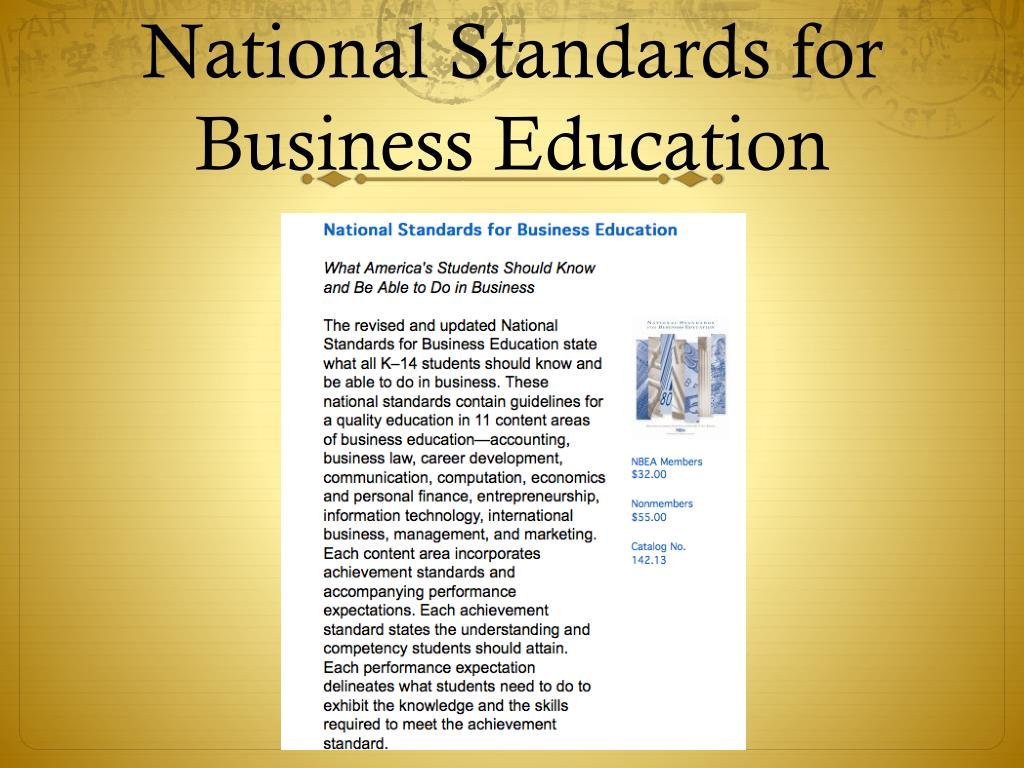
What Are the National Standards for Business Education?
The National Standards for Business Education are a set of guidelines designed to provide a uniform approach to teaching business-related subjects in K–12 education.They were first acquainted with addressing irregularities in business training across schools and to adjust educational program objectives to the requests of a globalized economy. Created by specialists in business training, these guidelines stress decisive reasoning, down-to-earth application, and deep-rooted learning.
The standards not only define what students should know but also highlight the skills and attitudes they should develop. By laying out clear benchmarks, NSBE guarantees that understudies are good to go for advanced education, business ventures, or professions in different business areas.
Core Areas Covered by NSBE
The NSBE covers a wide range of topics critical to business education. These include:
- Bookkeeping and Money: Grasping monetary standards, planning, and financial navigation.
- Business venture: Creating abilities for advancement, business arranging, and chance administration.
- Showcasing: learning systems for advancing items and administrations really.
- Business Regulation and Morals: Acquiring information on legitimate standards and moral practices in the business world.
- Innovation in Business: Utilizing computerized devices to improve efficiency and direction.
These regions are organized to expand on one another, guaranteeing a gradual opportunity for growth from rudimentary through secondary school.
Key Goals of the NSBE
The essential objectives of the NSBE include:
- Arrangement with Labor force Needs: Overcoming any issues between classroom learning and certification
- strategic policies.
- Ability Improvement: Encouraging fundamental abilities like critical thinking, correspondence, and cooperation.
- Worldwide Mindfulness: Getting ready understudies to flourish in an associated and cutthroat worldwide economy.
- Versatility: empowering understudies to embrace change and development in the work environment.
These goals expect to make a dynamic and future-prepared educational program that benefits the two understudies and instructors.
Why Are Public Norms Vital?
Without clear norms, business schooling can fluctuate extraordinarily in quality and concentration. The NSBE resolves this issue by giving a typical structure that schools can adjust to their requirements. These norms are especially significant for:
- Consistency: Guaranteeing that all understudies, paying little mind to area, approach great business training.
- Pertinence: keeping educational programs lined up with current and arising industry patterns.
- Responsibility: Empowering schools to quantify the adequacy of their projects against broadly perceived benchmarks.
Managers benefit from the confirmation that graduates have a reliable arrangement of abilities, while understudies gain an upper hand in their professions.
The Structure of NSBE
The NSBE structure is intended to be adaptable, permitting schools to fit it to neighborhood needs while keeping up with public consistency. Key components include:
- Grade-Level Benchmarks: Explicit learning results for rudimentary, center, and secondary school understudies.
- Mix with Different Subjects: Empowering cross-disciplinary learning, like joining business with math or social examinations.
- Vocation Pathways: Adjusting training to profession choices in fields like money, showcasing, and innovation.
This organized methodology makes it simpler for teachers to plan educational programs that connect with understudies and accomplish quantifiable results.
Challenges in Taking on NSBE
Notwithstanding its advantages, the execution of the NSBE can confront obstacles, for example,
- Asset Abberations: Schools in underserved regions might come up short on financing or devices expected to convey successful business training.
- Protection from Change: Educators acquainted with conventional techniques might find it trying to adjust to new norms.
- Innovative Boundaries: Restricted admittance to innovation can impede endeavors to modernize business schooling.
Tending these difficulties requires cooperative endeavors from teachers, policymakers, and networks.
Benefits for Understudies
Understudies are the essential recipients of the NSBE. By sticking to these guidelines, they gain:
- Vocation status: creating abilities that businesses esteem.
- Decisive reasoning: improving their capacity to tackle complex issues.
- Certainty: Building the confidence expected to succeed in business and then some.
Also, the accentuation on useful application guarantees that understudies can flawlessly change from school to the working environment.
Conclusion
The National Standards for Business Education are a cornerstone of modern education, ensuring that students are equipped with the skills and information they need to prevail in a unique business climate. By advancing consistency, importance, and versatility, the NSBE benefits understudies, teachers, and the more extensive business local area. For these principles to arrive at their maximum capacity, partners should team up to beat difficulties and embrace development.
Why are these standards essential for students?
They prepare students for careers, entrepreneurship, and higher education by teaching essential skills.
How do educators implement these standards?
By designing curricula aligned with the guidelines and incorporating varied teaching methods and assessments.
What challenges do schools face in adopting these standards?
Resource constraints, balancing national and local priorities, and keeping up with industry trends are common issues.
How can students benefit from following these standards?
Students gain practical skills, critical thinking abilities, and a competitive edge in the job market.









